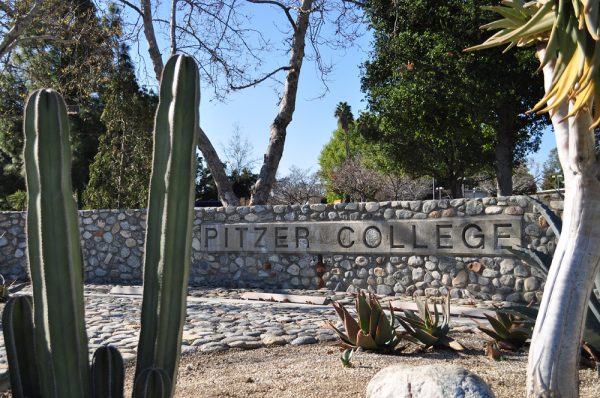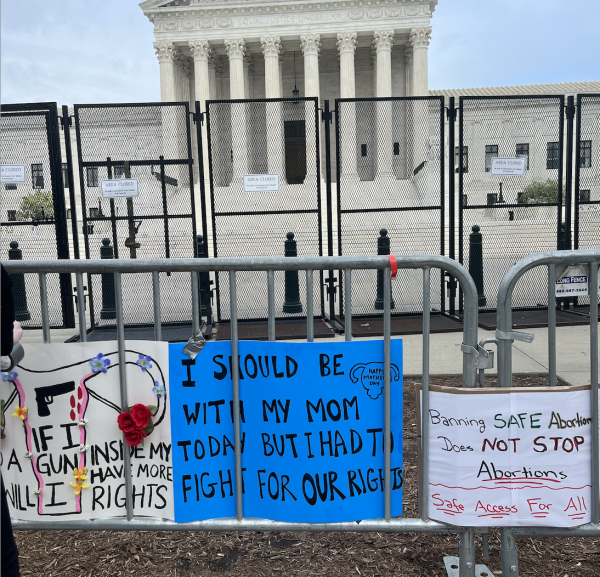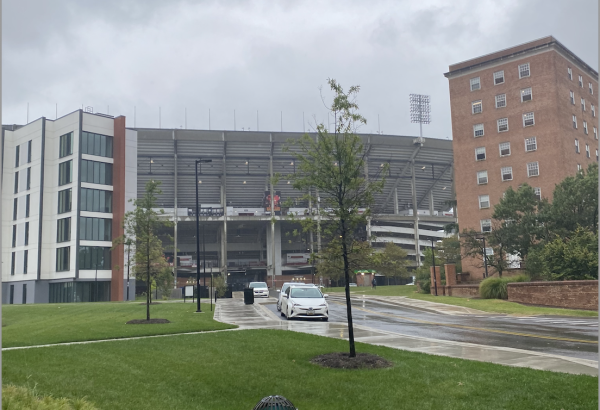Opinion: Hogan’s vote for Ronald Reagan is unacceptable
photo courtesy of Creative Commons
Governor Larry Hogan attends a ceremony at Fort Meade, before receiving a tour of the facility.
December 8, 2020
After four years of increasing popularity and national attention, Maryland Governor Larry Hogan voted against his Republican Party on election day. He also voted against the Democratic Party. In fact, Hogan chose not to vote for any party, candidate or living American eligible for the office of president when he decided to write in deceased former President Ronald Reagan on his ballot.
As a successful Republican in a democratic state, there is speculation that Hogan is preparing for a future presidential run. This attention undoubtedly factored into his decision, as voting for current President Donald Trump would have angered Democratic and Republican moderates, but voting for President-elect Joe Biden would have angered the conservative base and far-right.
Hogan defended his vote for Reagan by arguing that he felt it was the right time to make a statement in a state almost certainly projected to vote for Biden. This statement, at least from the Governor’s perspective, called for change in our politics.
The irony in this defense is that four years ago, Hogan voted for his father as a write-in candidate with the same reasoning, which means our sitting Governor has not seriously voted in a presidential election since 2012. Words of reform do not ring less hollow than a Governor who willingly allowed a radical conservative faction to take hold of his party over the last decade but now talks about change in politics. Hogan had two opportunities over the last eight years to actually use his voice and vote to make a difference in his party and our country, but both times he chose not to.
While Hogan argues that his vote in Maryland is just as significant as my next-door neighbor’s, the reality is that a Governor’s vote is news, and his reasoning can change minds. His actions in the last two elections minimized the importance of the democratic process, and the necessity to pick the best commander-in-chief possible from the perspective of Maryland voters. If Hogan had voted for a real candidate, he would have sent a fundamentally different message: that the survival of democracy hinges on the ability of its citizens to acknowledge its government’s imperfection, yet accept full individual responsibility for that government’s successes and failures.
Because this fundamental right and responsibility is only successful when voters actually believe in improving society, Hogan’s actions also set a terrible precedent. If every American voter acted with the same dismissive attitude as Hogan did in this election, our executive branch would fail to exist. In Genesis, the line “I am my brother’s keeper” has been used to describe smoothly functioning societies, where everyone understands their responsibilities. Leaders should be embodying this message of civic responsibility and improvement, not ignoring it.
In response to Hogan’s pick, some Democrats voiced disapproval of Hogan’s specific choice of Reagan. They remember the 40th president’s welfare cuts and upper-class tax breaks leading to a drastic increase in African-American poverty and unemployment rates, not to mention having called African diplomats “monkeys” on a call with fellow Republican Richard Nixon.
Regardless of these partisan objections to Reagan’s policies, Hogan’s choice of picking a dead man was equivalent to him not voting at all, which is a transgression that transcends partisan politics.
Our country’s history is fraught with instances of voter suppression. It was one hundred years ago that women finally got the right to vote, and less than sixty years ago that the Jim Crow era suppressed African-Americans from exercising the same right. And by ignoring his responsibility, Hogan dismissed the sacrifices of countless Americans who have laid down their lives throughout history to secure this fundamental right. In an age where our vote represents our stake in this democracy and gives us the chance to enact meaningful change, Hogan, an elected leader himself, decided to prioritize his political image.
While over 150 million Americans arrived at the polls on November 3 to give their input regarding the direction of this country, Hogan sidestepped reality for the second time in a row by avoiding the most crucial right and responsibility that Americans possess: our vote.


















